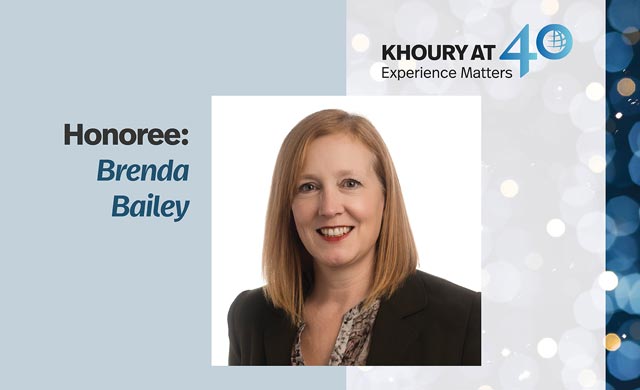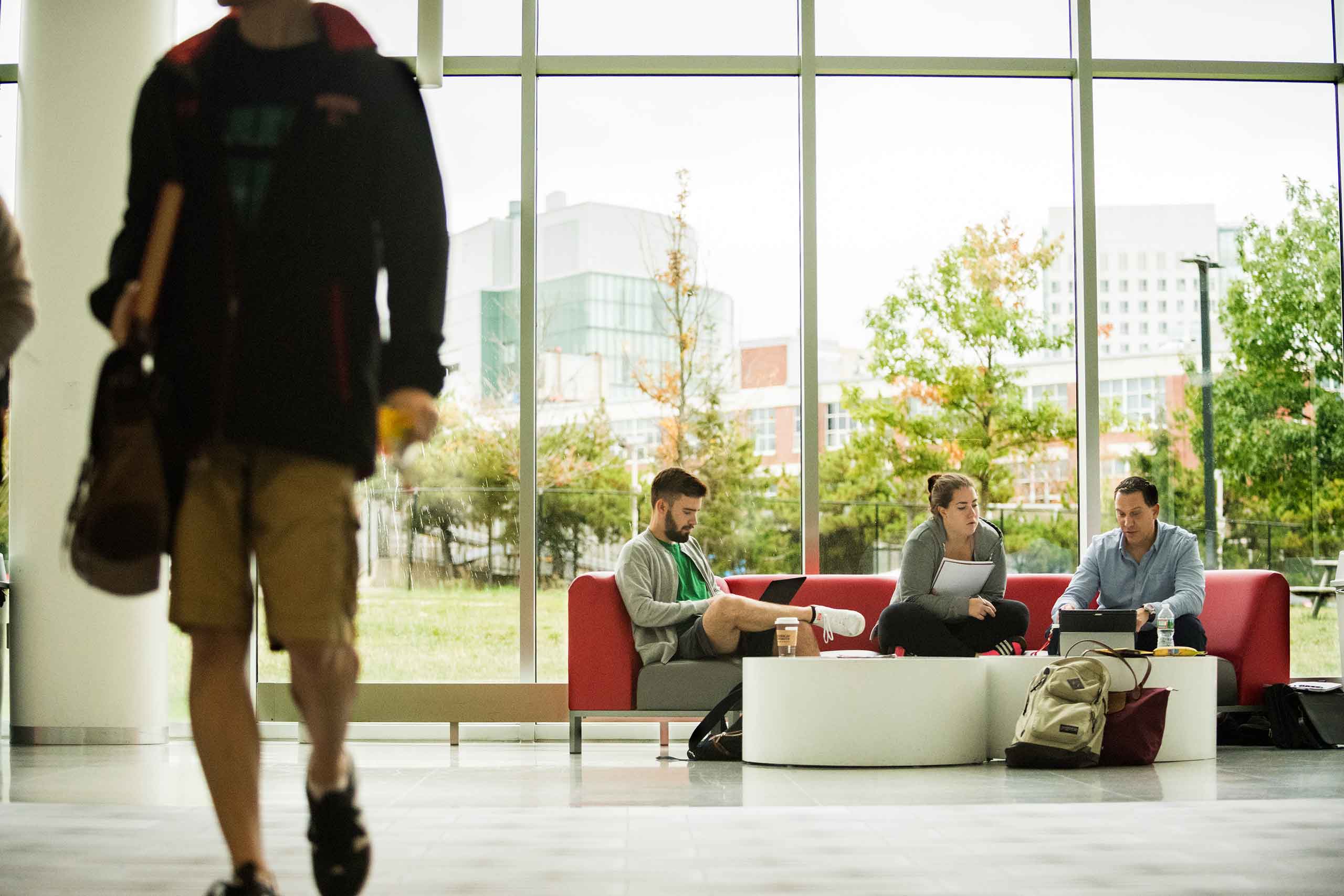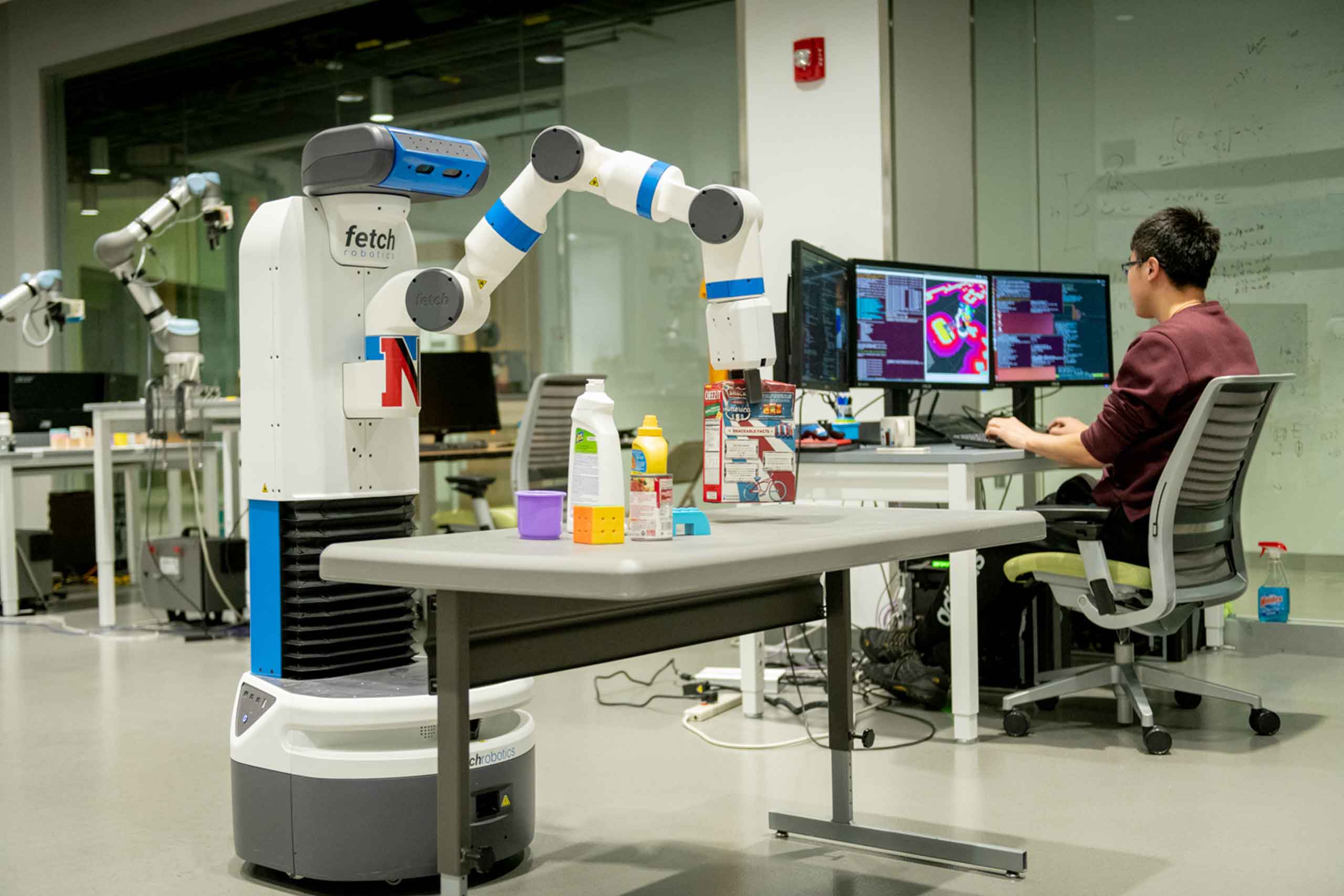





As Northeastern University explored launching a new computer science campus in Vancouver, British Columbia, Canada’s second largest tech and innovation hub, they received invaluable support from an expert in the needs of both the industry and the region—Brenda Bailey. Bailey, a leader in the local tech sector, held roles ranging from co-founding Canada’s first women-owned-and-operated video game studio to leading British Columbia’s interactive and creative digital marketing association, DigiBC. So, when she learned about Northeastern’s vision for supporting the local tech ecosystem, Bailey was thrilled at the chance to help bring the idea to fruition.
It all began when Bailey’s former colleague at the British Columbia Institute of Technology (BCIT), Bethany Edmunds, went to work for Khoury College. Edmunds, now a teaching professor and the director of computing programs at Northeastern’s Vancouver campus, shared with Bailey the college’s vision to prepare more women—and other populations underrepresented in the tech sector—for computer science careers. The college was looking for support in determining the best way to carry out its vision for the new campus. As Edmunds said, “We want to be part of the ecosystem. We recognize and respect what’s already here, so to have somebody that fully understands the nuances and can help inform where our value gets added, it allows us to be a better team player.” Bailey provided that guidance.

Brenda Bailey
In 2019, Bailey met with Northeastern President Joseph Aoun and provided input as part of his informal advisory group. Throughout the development process, Bailey shared insights and advice around the strategic direction of the program. As the school prepared to apply to the BC Accrediting Board, Bailey helped to inform their approach of addressing the gap in research institutions offering master’s degrees, with particular emphasis on DEIAB. Bailey also wrote letters of recommendation and drew on her extensive network to make introductions to key industry and government partners.
As she helped the university find their place in the local education sphere, Bailey connected closely with Khoury College’s mission of “CS for Everyone.” Having focused much of her career on helping underrepresented groups, particularly women and First Nations people, move into tech, she saw the opportunities the Khoury programs offered. This was especially true of the Align program, which provides a two-semester bridge to prepare students from non-CS undergraduate backgrounds to complete a master’s program in data science or computer science. For students who may have gotten the message early on that computer science is not for them, Align provides a way to make the career shift a reality, something that Bailey feels the province really needs.
“When you’re a minority in a particular setting, it often can communicate to you that you don’t belong there,” Bailey said. “I was very often in rooms where I was the only woman leader. Those types of communications are done subtly through who’s represented in particular areas.” Bailey also believes that who makes our technology matters. “With technology, we are creating tools,” she said. “But unlike a shovel or a hammer, technology tools come with values laden within them. It’s really important that we understand that and ensure that those values express the values of all of us, not just one small segment. There are many examples of tech gone wrong because it hasn’t been inclusive. That’s a contribution that Northeastern is helping us with, and it’s deeply important.”
Bailey also understands the challenges that students may face even after graduating from Khoury College or another post-secondary institution, so she saw this as an opportunity to overhaul the Innovator Skills Initiative (ISI) program. The ISI program was originally designed to help recent public university CS graduates who were having trouble finding their first job because companies only wanted people with one to two years of experience. With the increased need for new talent in the region, this was no longer an issue, but the problem had shifted to one of bias in who gets hired for these early-career jobs.
“With technology, we are creating tools. But unlike a shovel or a hammer, technology tools come with values laden within them. It’s really important that we understand that and ensure that those values express the values of all of us, not just one small segment.” — Brenda Bailey
Bailey and the ISI team introduced a new $15 million program to focus on supporting people facing these barriers. The program provided grants to hiring companies to cover the mentorship required for onboarding someone from an underserved community with no experience. The revamped program also expanded the range of eligible post-secondary programs to include both public and private institutions, which allowed Northeastern to extend the opportunity to their graduates.
Brenda Bailey was elected MLA (Member of the Legislative Assembly) for Vancouver-False Creek in 2020. She is now the Minister of Jobs, Economic Development, and Innovation for British Columbia. She sees the future of the local technology industry as a busy one, with a continued role for both public and private institutions in the region.
“There are a million people that we need to train in the next 10 years,” Bailey said. “Our industries are all transitioning to become tech enabled. Our future is in sustainable technology and a green economy. And those objectives align very strongly with what Northeastern brings to the table and the training that they provide. It’s a really strong fit, and we’re very grateful to have them do this work.”
As Northeastern University explored launching a new computer science campus in Vancouver, British Columbia, Canada’s second largest tech and innovation hub, they received invaluable support from an expert in the needs of both the industry and the region—Brenda Bailey. Bailey, a leader in the local tech sector, held roles ranging from co-founding Canada’s first women-owned-and-operated video game studio to leading British Columbia’s interactive and creative digital marketing association, DigiBC. So, when she learned about Northeastern’s vision for supporting the local tech ecosystem, Bailey was thrilled at the chance to help bring the idea to fruition.
It all began when Bailey’s former colleague at the British Columbia Institute of Technology (BCIT), Bethany Edmunds, went to work for Khoury College. Edmunds, now a teaching professor and the director of computing programs at Northeastern’s Vancouver campus, shared with Bailey the college’s vision to prepare more women—and other populations underrepresented in the tech sector—for computer science careers. The college was looking for support in determining the best way to carry out its vision for the new campus. As Edmunds said, “We want to be part of the ecosystem. We recognize and respect what’s already here, so to have somebody that fully understands the nuances and can help inform where our value gets added, it allows us to be a better team player.” Bailey provided that guidance.

Brenda Bailey
In 2019, Bailey met with Northeastern President Joseph Aoun and provided input as part of his informal advisory group. Throughout the development process, Bailey shared insights and advice around the strategic direction of the program. As the school prepared to apply to the BC Accrediting Board, Bailey helped to inform their approach of addressing the gap in research institutions offering master’s degrees, with particular emphasis on DEIAB. Bailey also wrote letters of recommendation and drew on her extensive network to make introductions to key industry and government partners.
As she helped the university find their place in the local education sphere, Bailey connected closely with Khoury College’s mission of “CS for Everyone.” Having focused much of her career on helping underrepresented groups, particularly women and First Nations people, move into tech, she saw the opportunities the Khoury programs offered. This was especially true of the Align program, which provides a two-semester bridge to prepare students from non-CS undergraduate backgrounds to complete a master’s program in data science or computer science. For students who may have gotten the message early on that computer science is not for them, Align provides a way to make the career shift a reality, something that Bailey feels the province really needs.
“When you’re a minority in a particular setting, it often can communicate to you that you don’t belong there,” Bailey said. “I was very often in rooms where I was the only woman leader. Those types of communications are done subtly through who’s represented in particular areas.” Bailey also believes that who makes our technology matters. “With technology, we are creating tools,” she said. “But unlike a shovel or a hammer, technology tools come with values laden within them. It’s really important that we understand that and ensure that those values express the values of all of us, not just one small segment. There are many examples of tech gone wrong because it hasn’t been inclusive. That’s a contribution that Northeastern is helping us with, and it’s deeply important.”
Bailey also understands the challenges that students may face even after graduating from Khoury College or another post-secondary institution, so she saw this as an opportunity to overhaul the Innovator Skills Initiative (ISI) program. The ISI program was originally designed to help recent public university CS graduates who were having trouble finding their first job because companies only wanted people with one to two years of experience. With the increased need for new talent in the region, this was no longer an issue, but the problem had shifted to one of bias in who gets hired for these early-career jobs.
“With technology, we are creating tools. But unlike a shovel or a hammer, technology tools come with values laden within them. It’s really important that we understand that and ensure that those values express the values of all of us, not just one small segment.” — Brenda Bailey
Bailey and the ISI team introduced a new $15 million program to focus on supporting people facing these barriers. The program provided grants to hiring companies to cover the mentorship required for onboarding someone from an underserved community with no experience. The revamped program also expanded the range of eligible post-secondary programs to include both public and private institutions, which allowed Northeastern to extend the opportunity to their graduates.
Brenda Bailey was elected MLA (Member of the Legislative Assembly) for Vancouver-False Creek in 2020. She is now the Minister of Jobs, Economic Development, and Innovation for British Columbia. She sees the future of the local technology industry as a busy one, with a continued role for both public and private institutions in the region.
“There are a million people that we need to train in the next 10 years,” Bailey said. “Our industries are all transitioning to become tech enabled. Our future is in sustainable technology and a green economy. And those objectives align very strongly with what Northeastern brings to the table and the training that they provide. It’s a really strong fit, and we’re very grateful to have them do this work.”











